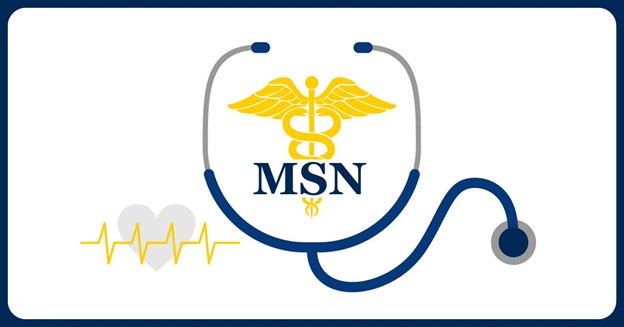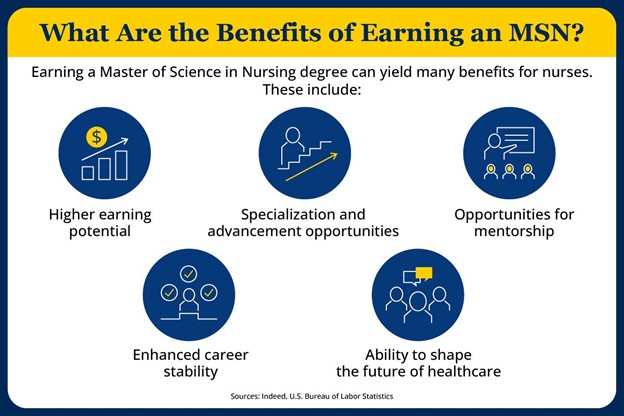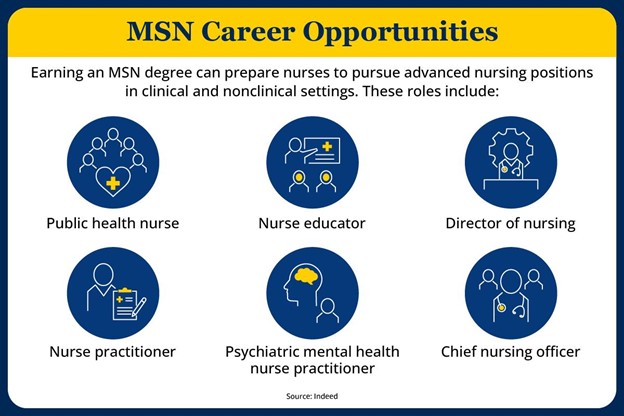What Can You Do With an MSN?

Nurses are often the primary point of contact for patients, which allows them to directly influence patients’ health outcomes by monitoring their conditions, educating them about their treatments, and coordinating their care with other healthcare professionals.
Advanced practice nurses also play a key role in mitigating the effects of the ongoing physician shortage, offering specialized nursing care, and implementing principles such as value-based care.
An essential step for those interested in pursuing an advanced nursing role is earning a Master of Science in Nursing (MSN) degree, which can dramatically broaden their career options and provide them with the opportunity to shape the future of healthcare. Read on to learn what you can do with an MSN and why earning a master’s degree can be so important for nursing professionals interested in advancing their careers.
What Is an MSN Degree?
A Master of Science in Nursing is a graduate degree designed to deepen the nursing knowledge and skills of those already practicing as registered nurses (RNs). This expertise prepares nurses to pursue advanced nursing roles. MSN careers encompass leadership positions as advanced practice registered nurses (APRNs), administrators, and educators.
Typically, it takes two to three years for RNs without a Bachelor of Science in Nursing (BSN) to complete an MSN degree program. For individuals who have a BSN, it usually takes about two years. While program requirements vary, prospective students generally must fulfill prerequisites that include a minimum GPA, clinical experience, and completing specific courses, including statistics.
Prospective MSN students also must fulfill degree-related requirements. Some programs require a BSN, while others offer an MSN curriculum specifically structured to build from a student’s previous educational or professional experience, such as an RN to MSN program designed for practicing RNs with an Associate Degree in Nursing (ADN).
An MSN program’s curriculum commonly covers core topics that are applicable to all advanced nursing roles, such as nursing research, ethics, and health policy.
MSN Degree Specializations
MSN students interested in becoming nurse practitioners (NPs) can focus their education on a specific area of care delivery. MSN specializations include the following:
- Psychiatric/Mental Health Nurse Practitioner: Psychiatric/mental health nurse practitioners (PMHNPs) focus on diagnosing and treating patients of all ages dealing with mental health and substance abuse issues. They deliver holistic mental health assessments and provide treatment to individuals, families, and groups.
- Adult-Gerontology Primary Care Nurse Practitioner: Adult-gerontology primary care nurse practitioners (AGPCNPs) concentrate on providing primary care to patients across the adult life span. They develop care strategies that meet each patient’s unique healthcare needs during each life stage from adolescence to old age. While these nurses can start working with patients once they turn 18, some states allow them to see patients as young as 13.
- Family Nurse Practitioner: Family nurse practitioners (FNPs) provide care to patients of all ages, including infants and children. The broad scope of nurses who become FNPs makes them instrumental in delivering quality primary care, especially in areas underserved by primary care physicians.
These specializations allow nurse practitioners to develop significant expertise in the conditions and issues that their patients face — ultimately helping them deliver a higher level of care tailored to their patients’ needs.
What Are the Benefits of Earning an MSN?
Earning an MSN degree can provide nurses with a range of advantages, both professional and personal. Pursuing an advanced education can lead to a more rewarding career and allow nurses to have a greater impact on their patients and communities.

Higher Earning Potential
Since the roles that an MSN degree can lead to often have greater responsibilities and the potential for a greater impact than other nursing roles, they also have a higher earning potential. The median annual salary of individuals with an MSN degree was $104,000 in April 2024, according to the compensation data site Payscale, compared to $77,000 for nurses with an ADN and $94,000 for those with a BSN. A nurse’s compensation depends on their specific position, as well as factors such as their experience level and the job’s location.
Significant Job Growth
The ongoing nurse and physician shortages have created a pressing need for advanced practice nurses and a very promising job market. The U.S. Bureau of Labor Statistics (BLS) projects a 38% increase in positions for nurse anesthetists, nurse midwives, and nurse practitioners — all roles that require an MSN degree or higher — between 2022 and 2032. This is substantially higher than the overall projected job growth rate of 3%.
Access to Advanced Career Opportunities
Earning an MSN opens the door to a wide range of jobs that require an advanced degree. These MSN careers include advanced practice nursing positions, such as nurse practitioner roles. An MSN degree can also lead to leadership positions in administration or education, allowing nurses to directly influence the next generation of nursing professionals.
Opportunities to Work Independently
Some states grant advanced practice nurses such as nurse practitioners full practice authority. This means they can diagnose and treat patients without the supervision of a physician, including prescribing medications. This can allow nurses to open their own private practices, which can significantly impact areas lacking a sufficient number of primary care physicians.
Nursing Specialization
Many MSN programs offer students interested in becoming nurse practitioners the chance to concentrate their practice on a specific type of care. This specialization can focus on a certain patient demographic, such as pediatrics, adult gerontology, or women’s health, or on a particular area of healthcare, such as oncology.
Mentorship Opportunities
The increased knowledge and advanced skill set that comes with earning an MSN provide graduates with the opportunity to mentor less experienced nursing professionals. By sharing their insights and expertise, they can help newer nurses gain a greater understanding of how to manage their nursing responsibilities. Mentorship can also lead to collaboration opportunities that mutually benefit both mentors and mentees.
Enhanced Career Stability
Nurses who pursue an advanced specialization can gain a higher level of job security and career stability. Nurses with unique expertise can often exercise more control over their career trajectory, as in-demand skills can be easily transferred to different facilities and locations.
Ability to Shape the Future of Healthcare
Nurses in advanced roles can have a greater influence than other nurses in areas such as policy implementation, technology integration, and the application of strategies related to evidence-based practice. As the healthcare system evolves to address emerging issues, advanced practice nurses can help guide the conversation to include topics such as social justice and health equity.
Enhanced Capacity to Improve Patient Outcomes
The knowledge and skills gained in an MSN program enable nurses to make crucial decisions that can improve care delivery and efficiency. Nurses with advanced degrees are often better equipped than other nurses to identify complex health issues and communicate with healthcare professionals at all levels, which can lead to better outcomes for patients.
MSN Careers at a Glance
What can you do with an MSN degree? Quite a lot. From administrative and executive roles to nursing jobs, MSN-educated nurses can choose from a number of ways to positively impact healthcare. These include nursing positions in education, leadership, and advanced or specialized clinical care. Some positions may require additional education, training, or certification.

Public Health Nurse
Public health nurses coordinate health services and provide health education to a specific community. Nurses in this proactive role strive to improve the population’s health through preventive measures. They develop community wellness plans, advocate for immunizations, and educate people to encourage them to make healthy choices. Successful public health initiatives can improve the health and quality of life of people in their community.
Public health nurses work in numerous settings, including clinics, schools, and government agencies. In addition to a clinical nursing background, those in the role should have strong analytical skills to be able to identify a community’s health needs. They must also have excellent communication and interpersonal skills to be able to encourage community members to adopt healthy lifestyles. Additionally, they must work well in teams, as their work requires collaboration to roll out programs and activities. The median annual salary for public health nurses was approximately $72,310 as of May 2024, according to Payscale.
Nurse Educator
Nurse educators teach the next generation of nurses the fundamentals of nursing. They create curricula that encompass lessons taught in both classrooms and controlled clinical settings. This allows educators to help students apply what they’ve learned to real-world situations.
Nurse educators need to monitor emerging medical innovations and best practices as they prepare their lesson plans and curricula. They should have strong analytical, communication, and interpersonal skills to effectively evaluate and assess both the curriculum and their students’ performance. Payscale reports that nurse educators had a median annual salary of approximately $83,950 as of April 2024.
Director of Nursing
Directors of nursing oversee the business side of a healthcare facility’s nursing department. They develop strategies to keep nursing operations running smoothly, such as addressing staffing needs, creating budgets, implementing policies and procedures, and setting goals for various teams. They also often represent the nursing staff when interacting with other departments and outside interests, such as shareholders, and advocate for nurses when issues arise.
Because they are responsible for so many aspects of healthcare operations, directors of nursing must have strong leadership skills, along with advanced critical thinking and decision-making skills. Communication skills are also crucial as their duties involve interaction with other departments. The median annual salary for directors of nursing is $98,430 as of May 2024.
Nurse Practitioner
Nurse practitioners provide holistic healthcare to patients. Their scope of practice includes conducting physical exams, ordering diagnostic tests, analyzing test results, diagnosing illnesses and diseases, and creating treatment plans. They also collaborate with other healthcare professionals to build individual patient care strategies that encourage optimal health. In states where they have full practice and prescriptive authority, NPs can work independently and prescribe medicine.
MSN programs help these nurses develop the clinical nurse practitioner skills required to provide care to patients. They also learn soft skills such as communication, critical thinking, attention to detail, and resourcefulness. Nurse practitioners also need to cultivate certain interpersonal skills such as compassion and cultural competence. The BLS reports that the median annual salary for nurse practitioners was $126,260 as of May 2023.
Psychiatric Mental Health Nurse Practitioner
Psychiatric mental health nurse practitioners (PMHNPs) are specialized nurse practitioners who focus their care on patients dealing with any of a wide range of mental health issues. Common conditions they can diagnose and treat include depression, anxiety, addiction, and post-traumatic stress disorder (PTSD). These nurses can develop a rapport with their patients, which helps them make adjustments to their treatment strategies based on the patients’ evolving challenges.
PMHNPs must have strong clinical, communication, and problem-solving skills, and must also exhibit characteristics such as empathy and patience. According to Payscale, PMHNPs make an average annual salary of $119,840 as of May 2024.
Adult-Gerontology Primary Care Nurse Practitioner
Adult-gerontology primary care nurse practitioners (AGPCNPs) are primary care nurses who provide care to patients from adolescence through older adults. They treat patients with acute illnesses and chronic illnesses, such as diabetes, arthritis, and hypertension. They often work in long-term primary care facilities, like private practices or clinics, ordering diagnostic tests and administering appropriate treatment interventions.
AGPCNPs must possess strong interpersonal skills to build long-term relationships with patients. They should also exhibit patience and critical thinking when dealing with chronic, often complex conditions. According to Payscale, these professionals make an average annual salary of $107,530 as of January 2024.
Family Nurse Practitioner
Family nurse practitioners (FNPs) provide primary care services to patients from infant age to adulthood. They can work in many different primary health settings, including clinics, private practices, universities, and care centers. They treat chronic and acute illnesses, order diagnostic tests, develop and administer treatment, and maintain patient records.
FNPs should have strong attention to detail to accurately maintain health records. They should also have empathy and interpersonal skills to maintain strong patient relationships, as well as critical thinking to assess ongoing patient health concerns. According to Payscale, FNPs earn an average annual salary of $103,890 as of May 2024.
Chief Nursing Officer
Chief nursing officers (CNOs) are C-suite executive managers who oversee a healthcare organization’s nursing department. They coordinate strategies with other executives, integrating nursing care standards and nursing operations within the organization’s overarching growth and stability strategies. They also ensure the organization is compliant with current federal and state regulations.
CNOs must have strong leadership skills as well as competencies needed to effectively function in a C-suite role, such as strong collaboration, conflict resolution, attention to detail, and creative thinking skills. Payscale reports that the median annual salary for CNOs was around $143,000 as of April 2024.
Elevate Your Nursing Practice With an MSN
There are many possibilities when considering what you can do with an MSN. With a Master of Science in Nursing degree, you can pursue any of a number of advanced nursing roles. Whichever one you choose, you’ll have a career that can help improve patients’ care and outcomes.
Wilkes University can help you get ready to make a difference. By enrolling in one of our online programs, the RN to MSN or BSN to MSN (Nurse Practitioner), and choosing between the MSN-PMHNP, MSN-AGPCNP, or MSN-FNP concentrations, you’ll have the opportunity to advance your knowledge and skills through a holistic curriculum that emphasizes the latest in evidence-based practice — all on a timeline that fits your schedule. Find out how Wilkes can prepare you for the next phase of your healthcare career.
Recommended Readings




